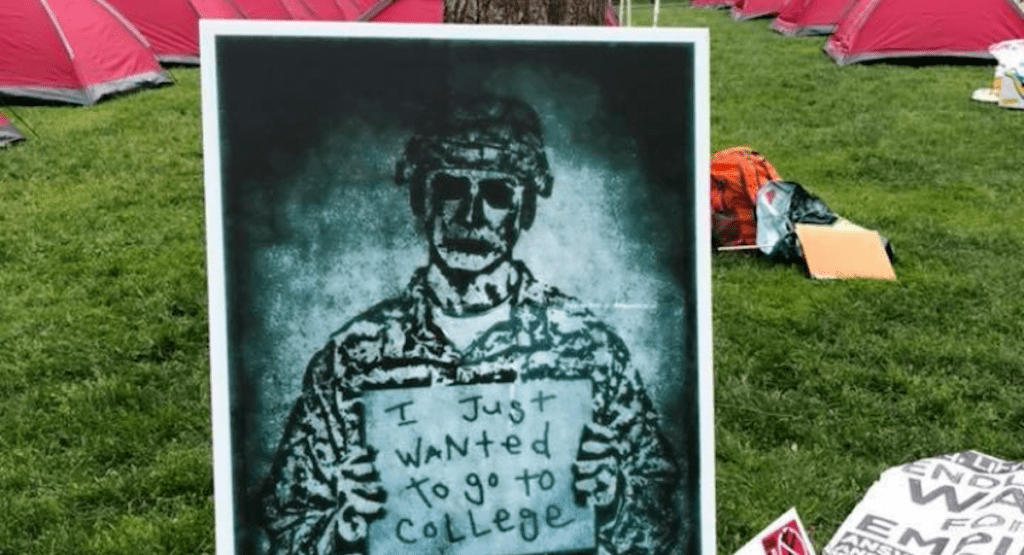
By Jarvis Benson and Shailly Gupta Barnes
(With support from Phyllis Bennis and Lindsay Koshgarian from the Institute for Policy Studies National Priorities Project)
In the 20 years after 9/11, the U.S. federal government has spent more than $21 trillion on militarization, from war, prison, policing, surveillance, and border enforcement — all in the name of security — without making any of us, or indeed the world, any safer.
- Since 2001, about 900,000 lives have been lost to U.S. war violence — with many thousands unaccounted for due to the loss of critical infrastructure like hospitals — and 37 million people displaced. (Watson Institute)
- The Pentagon and its war-making are a serious climate threat. The Pentagon is the world’s largest institutional user of petroleum: just one of its jets, the B-52 Stratofortress, consumes about as much fuel in an hour as the average car driver uses in seven years. (IPS, National Priorities Project)
- The U.S. military produces about fifty-nine million metric tons of greenhouse gas emissions annually. To put that in perspective, that’s more greenhouse gas emissions than entire industrialized countries, such as Sweden, Denmark, and Portugal. (IPS, National Priorities Project)
What takes place abroad eventually comes back home in the militarization of our communities.
- Today, state and local law enforcement agencies are in possession of almost $2 billion worth of military equipment transferred to them by the Pentagon since 9/11, including mine-resistant vehicles, aircraft, drones, military weapons, and ammunition. Police increasingly use these weapons of war on our streets.
- Of the 50 largest U.S. cities, more than half increased or maintained their police budgets last year, despite public demands to redirect funding to alternative safety institutions and to communities.
- There are about 3,000 troops deployed to the U.S. southern border with Mexico. And every year, hundreds of thousands of immigrants are locked up in over 200 ICE detention centers. A majority of these detention facilities are operated by private, for-profit companies. (Detention Watch Network)
- Since the 9/11 attacks, the Department of Homeland Security has consistently refused to properly address the rising threat of right-wing extremism – until it was too late to help prevent the assault on the Capitol of January 6th, 2021. (Watson Institute)
Wars are also harming military personnel, veterans and their families.
- Of the $14 trillion the Pentagon has spent over the last 20 years, less than one-quarter – $3.3 trillion – went to compensation for military personnel. In fact, entry-level pay for an enlisted service member in 2021 was just over $20,000, the equivalent of a $10.30 hourly wage. (Watson Institute)
- Veterans of the War on Terror have been subject to nonstop deployments over the last 20 years, taking a toll on their physical and mental health, family stability, and civilian career opportunities. They also suffer from high risks of suicide, homelessness, and family violence, among other long-lasting consequences of war.
- As many as 160,000 military families struggle to feed their families. (Feeding America)
Yet, we continue to spend an undue amount on the military.
- The annual Pentagon budget is over $750 billion annually, more than four times as much as the House version of the Build Back Better Act ($185 billion) and twice as much as the top-line spending proposed by President Biden earlier this year ($350 billion annually). (IPS)
These resources could be put to much better use, on programs and spending that would enrich life in this country and around the world.
- Just 10 percent of the Pentagon budget could fund 900,000 new teaching positions to reduce class sizes, create jobs, and make school — real school, not Zoom school — during the pandemic much safer. (IPS, National Priorities Project)
- The US could redirect military spending – and the greater resources that have been spent militarizing our society – to reduce wars, improve diplomacy, increase international assistance and meet the critical domestic challenges that have gone neglected for the last 20 years:
- $4.5 trillion could fully decarbonize the U.S. electric grid;
- $2.3 trillion could create 5 million $15 per hour jobs with benefits and cost-of-living adjustments for 10 years;
- $1.7 trillion could erase student debt;
- $449 billion could continue the extended Child Tax Credit for another 10 years;
- $200 billion could guarantee free preschool for every 3-and-4-year old for 10 years, and raise teacher pay;
- $25 billion could provide COVID vaccines for the population of low-income countries.
This is why the Poor People’s Campaign: A National Call for Moral Revival has been calling for the following around the Pentagon and military spending:
- An end to war authorizations currently on the books, and reform of the war authorization process to make Congress accountable;
- An immediate halt on Pentagon spending increases, a reduction in Pentagon spending by at least ten percent within one year and up to 50% within 10 years, with resources redirected to poor and low-income communities that have been disproportionately impacted by militarism, mass incarceration and the criminalization of poverty;
- Demilitarization of the southern border, including immediate freezes to the ICE and border patrol budgets, the end of immigrant detention, and the provision of humanitarian aid to those arriving at the border;
- An end to the domestic war on terror, including the profiling of immigrants and racial, national and religious groups, and the disproportionate incarceration of Black and Brown people; and
- An end to the transfer of military weapons to civilian law enforcement and to countries with oppressive regimes and human rights abuses.
For more information on militarism in your state, see here.
Resources for Additional Study:
Costs of War:
- https://watson.brown.edu/costsofwar/costs/human
- https://ips-dc.org/report-state-of-insecurity-cost-militarization-since-9-11/
- https://ips-dc.org/climate-militarism-primer/
Domestic Militarism
- https://www.militarytimes.com/news/2021/07/07/southern-border-mission-for-us-troops-extends-another-year/
- https://immigrantjustice.org/issues/immigration-detention-enforcement
- https://www.detentionwatchnetwork.org/issues/detention-101
- https://www.dla.mil/DispositionServices/Offers/Reutilization/LawEnforcement/PublicInformation/
- https://www.bloomberg.com/graphics/2021-city-budget-police-funding/
- https://www.dfas.mil/MilitaryMembers/payentitlements/Pay-Tables/Basic-Pay/EM/
- https://watson.brown.edu/costsofwar/files/cow/imce/papers/2021/Assessing%20DHS_Dahl_Costs%20of%20War.pdf
Veterans
- https://www.nbcnews.com/health/health-news/suicide-risk-rises-quick-repeat-deployments-study-shows-n867221
- https://www.militarytimes.com/news/your-military/2021/06/21/four-times-as-many-troops-and-vets-have-died-by-suicide-as-in-combat-study-finds/
- https://feedingamericaaction.org/learn/issue-areas/military-hunger/
Military Spending
- https://ips-dc.org/wp-content/uploads/2021/12/PPC-BBB-fact-sheet.pdf
- https://www.woodmac.com/news/feature/deep-decarbonisation-the-multi-trillion-dollar-question/
- https://otherwords.org/cut-the-pentagon-10-percent-invest-in-public-health/
- https://fred.stlouisfed.org/series/SLOAS
- https://www.whitehouse.gov/wp-content/uploads/2021/05/budget_fy22.pdf
- https://www.whitehouse.gov/briefing-room/statements-releases/2021/04/28/fact-sheet-the-american-families-plan/
- https://www.citizen.org/article/25-billion-to-vaccinate-the-world/
- https://otherwords.org/cut-the-pentagon-10-percent-invest-in-public-health/